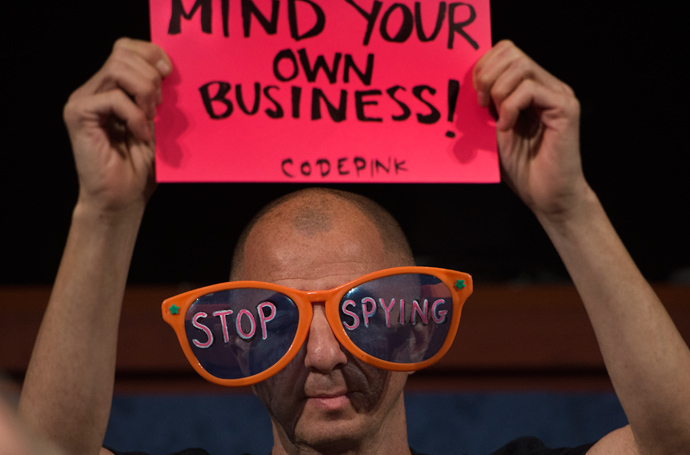NSA surveillance is ‘terrorism-lite’

The NSA is creating a culture of fear, making people afraid of using their own phones, independent US journalist David Seaman told RT. In the wake of revelations on AT&T selling data to the CIA, he is calling for an overhaul of US spying programs.
Reports on one of America's biggest telecom companies getting
millions every year from the CIA for allegedly
getting access to its vast database of call records are a sign of
the US turning into Orwellian surveillance state, where people
are terrorized out of using their own electronic devices, he
says.
A draft UN resolution, authored by Germany and Brazil,
that urges an end to global electronic espionage, is only a
half-measure, one of the things “that sound good but don’t
actually do anything,” Seaman says, adding that what’s needed is
“real reform” in US intelligence data gathering.
RT:Reports of the CIA paying one of the country's
biggest phone companies for access to private records add a new
dimension to what was previously known. How much more do you
think can be revealed from all this?
David Seaman: I think this is really interesting because
for one thing you can’t avoid AT&T. People say things like:
“Well, if you don’t like their business practices just go
somewhere else”. Good luck trying to avoid calling anybody who’s
an AT&T subscriber. That’s virtually impossible. You know I’d
like to see you try that. It’s a huge company that has its
footprint all over the globe. And they are just being paid to
hand out this customer information. And for my understanding US
citizens’ data is being partially scrubbed, when it’s handed
over, but these people overseas are still people and what we are
really doing with those revelations is undermining the basic
faith in things like telephones and the internet to conduct
business when it comes to commerce or journalism or sensitive
political negotiations. So, you know normal people like you and
me are going to stop using phones and the internet. And the
terrorists don’t use that stuff anyway. They are well aware of
what the CIA and the NSA are capable of technically. And they’ll
just go to writing notes and scraping them on the back of a
mountain goat or something. So, I think this is a light form of
terrorism where people are becoming afraid to use their own
technology, their own devices. It’s really kind of Orwellian and
the explanation they give for it does not make a lot of sense to
me.

RT:It seems that people with the means to do so will
be able to get their messages across. For the bulk of the
American people where does this really leave them?
DS: For the bulk of the American people, we still have not
gotten adequate answers from the administration. To this day,
right now as this goes out, people’s text messages and phone
calls are potentially being compromised by a number of government
agencies. This is a clear violation of the Fourth Amendment and
customers have nowhere to go, because I’m sure AT&T is not
alone in this sort of practice and it’s troubling. The government
argument has been: “Well, we need to find a needle in a haystack
and in order to do that we need as big a haystack as possible.”
But a lot of people out there, a lot of mathematicians and
analysts, have said that makes no logical sense at all. If you
try to find a needle in a haystack, you want that haystack to be
as small as possible. So why are they tracking the communications
of private citizens who have no connection to crime or terrorism?
What is their real goal here? It really seems a bit Orwellian. If
you are going after terrorism, you want to focus on those
needles, not on the whole haystack. And you see now the CIA, with
the NSA and the FBI, very interested in the typical
communications of American citizens and European citizens as
well.
RT:Brazil and Germany submitted a draft resolution to
the UN on the matter of electronic eavesdropping. Given that its
provisions are not legally binding, is this more of a symbolic
show of disapproval?
DS: I think that Angela Merkel and Germany are clearly upset. I
don’t think that’s for show. How much you can fix this stuff?
That’s a totally different issue. I understand that Google – as
part of separate revelations – is now working to encrypt their
lines between data centers, because it came out that those lines
were compromised as well. So, pretty much anything you send out
over the internet, you have to assume that it is or can be
compromised. It’s going to be a great opportunity for companies
that are focused on restoring privacy, but over the next few
months I think we are going to see a lot of things that sound
good but don’t actually do anything. These programs need to be
defunded, they need to be fully vetted by Congress. And that has
not been done for some 40 years. I mean the last time any of
these were reviewed was by the Church Committee [a US Senate that
investigated the secret services in the wake of the Watergate
scandal] back in the 1970s.
RT:So, you mentioned Angela Merkel. Clearly she is
outraged over this. But there’ve also been reports that the
German intelligence community collaborated to some extent with
the NSA. So where is kind of the line there?
DS: I don’t know how much day-to-day she was brought into
it. By the same token, I don’t know how much President Obama was
brought into the day-to-day decisions. But these intelligence
agencies need to make sure that they are operating within the
confines of the law, confines of our Western values and confines
of the constitution. Some of them don’t appear to be doing that
at the present time. So, hopefully we’ll see real reform and not
just talking heads saying that something needs to be done. I’d
like to see Congress actually pass a bill as opposed to just
reviewing this stuff.
The statements, views and opinions expressed in this column are solely those of the author and do not necessarily represent those of RT.












